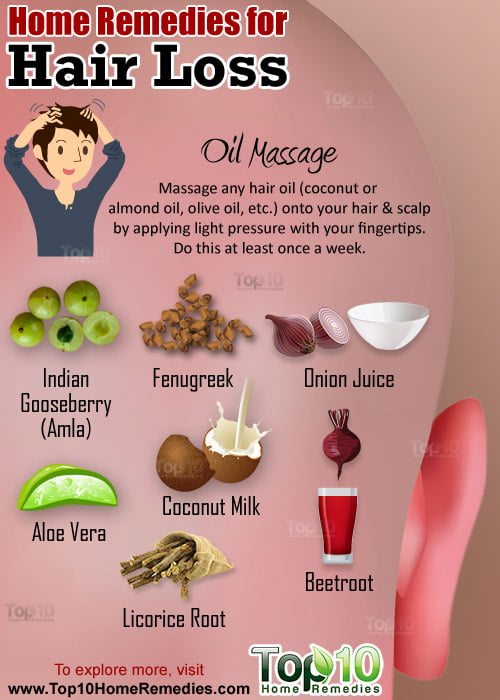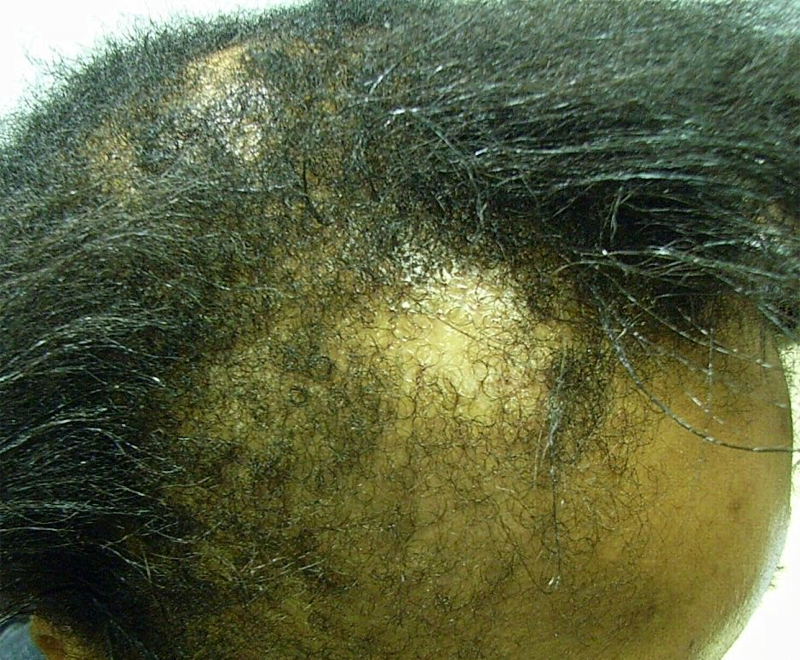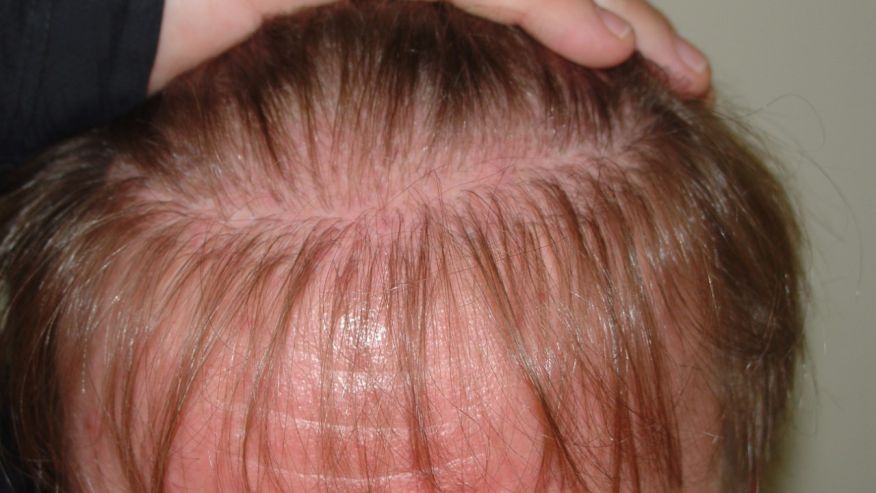Accutane was a brand name of the drug isotretinoin, which healthcare providers used to prescribe for treating severe acne. This drug can cause a number of side effects, and some people have concerns that taking isotretinoin can lead to hair loss.
Although Accutane is no longer available under that brand name, the active ingredient isotretinoin is still available under generic names and other brands.
Keep reading to learn more about why Accutane may cause hair loss, and for tips on reducing hair loss while using Accutane or similar products.

Isotretinoin is a synthetic form of vitamin A that helps suppress sebum production in the skin to reduce acne.
Accutane may affect the body in ways that could contribute to hair thinning or hair loss. For example, Accutane may affect the hair shafts and follicles themselves.
Most of the time, any hair loss is temporary, and the thin hair should start to thicken again with time. However, some people may notice a permanent change in their hair after taking isotretinoin.
Isotretinoin may also affect hormone levels, which could be another cause of thinning hair or shedding in some people.
One 2011 studyTrusted Source found that isotretinoin suppresses hormones in the pituitary glands. Although this may be helpful for acne, it may also shift hormones that influence hair growth.
Another study, the results of which appear in the journal Advances in Dermatology and AllergologyTrusted Source, measured the effects of taking Accutane for acne treatment.
Though the product usually cleared up the participants’ acne, it also caused some changes to their hair. For example, some people lost hair, while for others, their hair became thinner and less dense.
That said, this was a small study of just 30 people, and its results do not provide any strong evidence that this effect will occur every time.
Isotretinoin can also contribute to a number of other issues, and the researchers called for individualized treatment and close monitoring in each case.
A more recent studyTrusted Source suggests that isotretinoin may not actually cause significant hair thinning or hair loss.
After 3 months of normal use, some people with moderate-to-severe acne who took isotretinoin did experience changes to their hair. However, these changes were not statistically significant enough for the researchers to conclude that the drug causes hair thinning or hair loss.
This study also suggests that only a person taking very high doses of isotretinoin may experience altered hair growth. It is also important to note that isotretinoin may affect each person differently, which is why doctors tailor the dosage to each individual.
Due to the varying nature of isotretinoin’s effects on hair, it is still possible for some people to have lasting effects from taking the drug. For example, it may be that a person has taken too much, or that they have been taking it for a long time.
The important thing is to work directly with a doctor or dermatologist to create an individualized treatment plan in each case.
When using Accutane correctly, any side effects from isotretinoin should be mild. If a person does experience hair loss or thinning, these effects will usually be temporary.
Dermatologists tailor the treatment to each individual. They will want to start with a lower dosage and monitor a person’s reaction to the drug to see if they are very sensitive to its effects.
From there, they may then create a treatment plan using the lowest effective dosage, generally over the span of a few months.
There are also some things a person can do to limit any potential side effects. For example, they can:
Take additional medications
Depending on the individual’s reaction, doctors may also order additional medication to go with isotretinoin.
For instance, if a person is sensitive to the hormonal changes that cause hair loss, a doctor may also prescribe drugs such as finasteride (Propecia), which may promote hair growth.
Eat a healthful diet
Eating a healthful diet may be especially important while taking isotretinoin, to help prevent vitamin deficiencies.
Eating a diet rich in whole, natural foods and a wide variety of vegetables and fruits should help ensure that the hair has the nutrients it needs to stay strong.
Take a B vitamin complex
One studyTrusted Source found that isotretinoin treatment may cause vitamin B deficiency, specifically vitamin B-12 and vitamin B-9, or folic acid.
The researchers behind the study suggest taking a vitamin B supplement both before and during isotretinoin treatment. Also, be certain that the B vitamin complex includes vitamins B-12 and B-9.
Avoid vitamin A
Although doctors may recommend taking a vitamin supplement during treatment, they will likely tell the person to avoid vitamin A. Since isotretinoin is a synthetic form of vitamin A, adding even more of the vitamin to the body may have its own side effects and risks.
Reduce stress
Stress may also affect hormone levels, which could potentially make the symptoms of isotretinoin worse.
It is important to find ways to reduce stress. For example, a person can try breathing exercises, spending time outdoors, or yoga.
Care for the hair
Caring for the hair during treatment is especially important for keeping the individual hairs strong and preventing hair loss.
Some general hair care tips include:
- keeping the hair moist using nourishing oils or natural leave-in conditioners
- avoiding harsh chemicals or products that dry the scalp, such as sulfates or fragrances
- avoiding harsh processes such as drying, curling, or blow-drying the hair with very hot air
Accutane, which contains isotretinoin, may cause temporary hair loss or hair thinning in some people who are sensitive to it.
Healthcare providers tend to reserve isotretinoin for very severe cases of acne, though there may be some other options if the person experiences undesirable side effects.
Managing other factors may help reduce hair loss while using Accutane. Anyone who is uncertain about their treatment or side effects can speak with a doctor.
[“source=medicalnewstoday”]
















